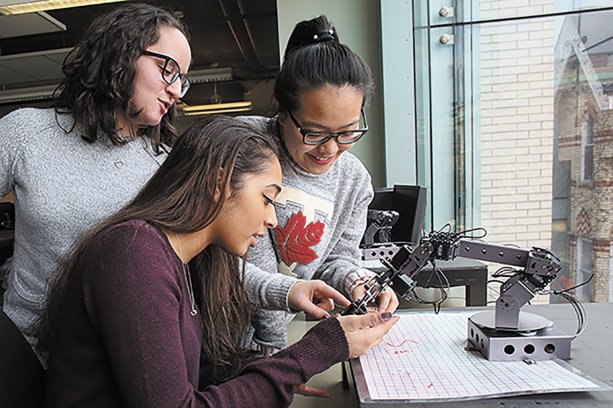Hundreds of aspiring female engineers chose to join the University of Toronto’s (U of T) Engineering program in the fall, making the proportion of women in its first-year class 40.1 per cent, the highest figure among engineering programs in Ontario.
"That means that U of T Engineering is starting to have a student body that reflects the world," said Dawn Britton, associate director of engineering outreach with the faculty of applied science and engineering. "We need diversity in our student body to respond to diverse questions that engineers are expected to answer and it’s important that we have all voices at the table."
The first step is breaking down stereotypes and casting aside the traditional views associated with engineering, Britton explained.
"Women are tired of the stereotype that only men can be engineers and that engineering is a male-dominated profession. They’re throwing that image aside and moving forward studying sciences and the maths with the same interest as their male counterparts," she said. "I think more and more women are interested in entrepreneurship and creating change and see that the field of engineering is a way to be able to do that."
Women are starting to see the opportunities the profession can offer, she added.
"Women that want to go into civil engineering or construction management didn’t necessarily realize that they can go and manage hundreds of people," explained Britton. "So the field has really diversified in a way that really attracts women."
Diversity and inclusivity are promoted by the university in a variety of ways. In terms of outreach, each year the faculty engages more than 10,000 elementary and secondary school students from across the Greater Toronto Area in a number of programs both on and off campus.
U of T Engineering undergraduate students, including members of the Engineering Society’s Hi-Skule outreach group and Women in Science and Engineering, visit schools throughout the province promoting the program.
The annual Young Women in Engineering Symposium aims to show students the positive impacts of engineers and the Girls Leadership Experience in Engineering allows aspiring engineering students to explore what the program has to offer.
"U of T engineering has outreach programs that start as early as Grade 3 and we see boys and girls come to these programs, but we do have an emphasis on encouraging young girls to come to our outreach programs," said Britton. "The unique piece is that we are working with current engineering students as well as alumni to deliver these programs and so that means we are putting a mentor or a role model right in front of these young people."
Christian Pavlidis, a first-year civil engineering student at U of T, said her interest in engineering was sparked in high school.
"It all started with my love of science and math," said Pavlidis, adding a civics and careers course in Grade 10 as well as teachers and parents encouraged her to look into engineering.
Her first exposure to the program was participating in a high school outreach program focused on math that left a lasting impression.
"It’s teaching girls to really embrace the love of math," Pavlidis said. "I know before there was a huge stigma around math…but I think it’s starting to go away a little bit and a lot more girls are reaching out which is great."
Although she was unsure of which direction to go at first, she soon realized her passion for civil engineering, which focuses on the design, construction and maintenance of structures and infrastructure. She said she chose U of T because she saw it as an "innovative leader in the engineering industry."
Pavlidis is also the first-year representative on the Civil Engineering Club.
Grace Lloyd is a first-year student taking industrial engineering, which deals with improving the way people interact with technologies and systems.
"I grew up with engineers all around me, a lot of my relatives are engineers and my dad is an industrial engineer," said Lloyd, who admits she didn’t always want to be an industrial engineer. "I didn’t like what he did, he couldn’t give me a straight answer on what he did and I hated Take Your Kid to Work Day.
"Then I went on a tour at another university and they didn’t offer industrial engineering so I offhandedly asked them ‘can you tell me what an industrial engineer is?’ They told me it was plant management and that’s actually what I really wanted to do."
She said stereotypes have shifted when it comes to engineering and with more women deciding to pursue it as a career, it has opened the door for others.
"Growing up, no one ever told me ‘you can’t do that’ but my dad told me sometimes in his engineering classes there were only three girls out of the hundred," said Lloyd, who also occasionally volunteers for Hi-Skule.
When asked about studying in a field where women are underrepresented, Lloyd said, "Originally, when I first decided that engineering is what I wanted to do, I was a little concerned that I wasn’t going to be taken as seriously. But now that I see I am in classes and no one is discriminating…I feel like I will be respected just as much as any man."







Recent Comments
comments for this post are closed